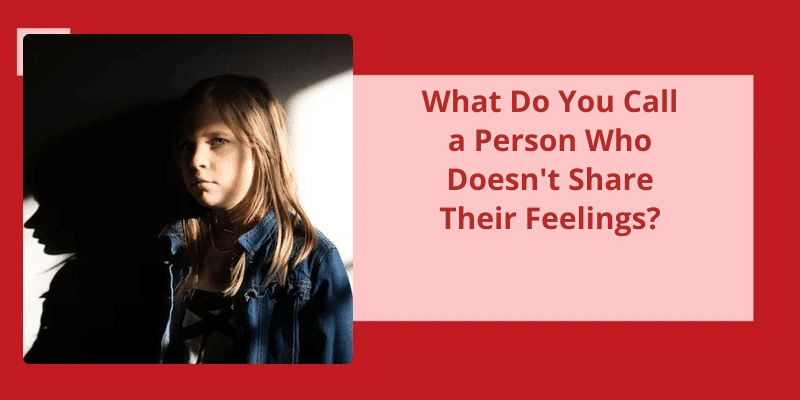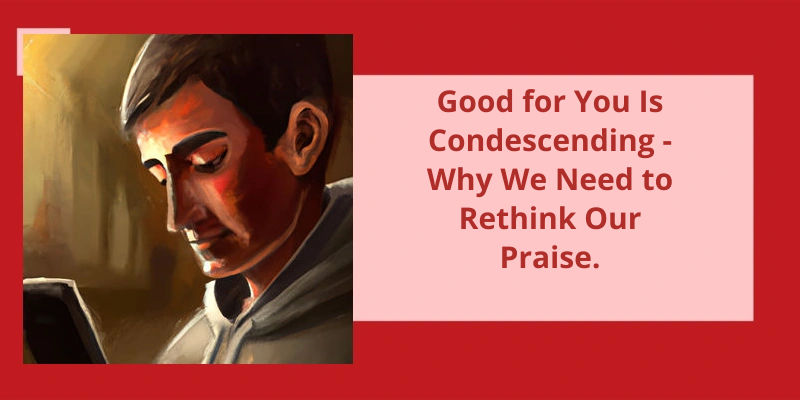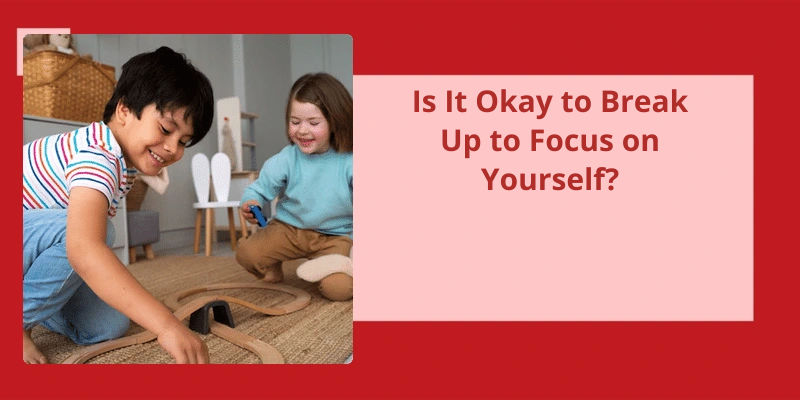Some people just don't like to share their feelings with the rest of the world. Maybe they've been hurt before, or maybe they just prefer to keep to themselves. Whatever the reason, these individuals are often referred to as "reticent." This term can express both quietness and restraint, suggesting that those who’re reticent are typically more reserved and less likely to open up in social situations. Being reticent about your feelings can be a challenge, especially in a world where emotional vulnerability is often celebrated. However, for many people, it's simply a part of who they are, and it's important to respect their boundaries and allow them the space they need to feel comfortable.
Why Do I Not Share My Feelings?
Others may have grown up in an environment where expressing vulnerability was not encouraged or was even discouraged. This can lead to a habit of bottling up ones emotions, which can be difficult to break. It can also lead to a fear of being judged or rejected for sharing ones feelings, which can further reinforce the habit of not sharing.
Some people may also struggle with identifying and processing their emotions. They may feel a general sense of unease or discomfort but have difficulty pinpointing the specific emotions causing these feelings. Without a clear understanding of what they’re experiencing, it can be difficult to express those feelings to others.
In some situations, cultural or gender norms may discourage expressing emotions. For example, men may feel societal pressure to present a tough exterior and not show vulnerability, while women may be expected to be emotional and nurturing but not express anger or assertiveness. These societal expectations can make it challenging for individuals to break free from these rigid roles and express their authentic feelings.
People may be afraid that expressing their emotions will lead to an argument, hurt someone elses feelings, or damage a relationship. This fear can be especially strong for those who’ve experienced conflict or rejection in the past.
Finally, some people may simply prefer to keep their emotions to themselves. They may feel that sharing their feelings wouldn’t lead to any positive outcome and would only make them more vulnerable. They may feel that they can better process and manage their emotions on their own, without input or advice from others.
Overall, there are many reasons why people may not share their feelings. It’s important to remember that everyone processes emotions differently and that there’s no one “right” way to express oneself. If you’re struggling to open up to those around you, consider seeking the support of a therapist or counselor who can help you work through any underlying issues.
The Potential Benefits and Drawbacks of Expressing Emotions in Different Settings (e.g. Workplace, Romantic Relationships, Friendships)
- Expressing emotions in the workplace
- Benefits:
- Can increase trust and authenticity in the workplace
- Can lead to better collaboration and problem-solving
- Can improve mental health and overall well-being
- Drawbacks:
- May lead to conflicts or misunderstandings
- May be perceived as unprofessional
- May create a sense of vulnerability or discomfort
- Expressing emotions in romantic relationships
- Benefits:
- Can strengthen emotional connection and intimacy
- Can lead to better communication and problem-solving
- Can help partners understand each other better
- Drawbacks:
- May lead to conflicts or misunderstandings
- May create a sense of vulnerability or discomfort
- May be perceived as excessive or needy
- Expressing emotions in friendships
- Benefits:
- Can strengthen emotional connection and support
- Can lead to better communication and problem-solving
- Can help friends understand each other better
- Drawbacks:
- May lead to conflicts or misunderstandings
- May create a sense of vulnerability or discomfort
- May be perceived as excessive or intrusive
It can be difficult to understand someone who doesn’t openly express their feelings. This type of person is often referred to as apathetic, meaning they show little to no emotion or indifference towards certain situations or people. This personality trait can make it challenging to connect with others and understand their emotions. In this article, we’ll explore the characteristics and potential causes of apathy, as well as strategies for dealing with individuals who display this behavior.
What Do You Call Someone Who Doesn’t Express His Feelings?
There’s a term to describe someone who doesn’t express their feelings – apathetic. This adjective means having or showing little or no emotion, with a general sense of indifference towards the world. An apathetic person is often seen as unfeeling, uncaring or detached.
Despite the negative connotation of apathy, some people choose to mask their emotions for various reasons. Perhaps they’ve been hurt before, or they don’t feel comfortable being vulnerable around others. Apathy can also be a defense mechanism for some individuals to cope with stress, anxiety or depression.
It’s important to note that apathy isn’t the same as introversion or shyness. Introverts enjoy solitude and introspection, but they can still express their emotions when appropriate. Shy individuals may struggle with social interactions, but they still have feelings and can share them with trusted friends or family.
Sometimes, apathy can lead to problems in relationships and social situations. If someone doesn’t express their feelings, it can be difficult for others to understand their intentions or needs. It can also be frustrating for those who’re trying to form close connections with them.
It’s essential to look beyond the surface level and try to understand the persons motivations for their emotional detachment. By doing so, we can cultivate more empathy and compassion towards individuals who struggle with expressing their feelings.
How to Communicate With Someone Who Doesn’t Express Their Feelings
When communicating with someone who doesn’t express their feelings, it’s important to be patient, respectful, and non-judgmental. Avoid making assumptions or jumping to conclusions. Give them space and time to open up, but also try to create a safe and comfortable environment for sharing. Practice active listening and validate their experiences. It may also be helpful to suggest alternative ways of expressing emotions, such as through writing or other creative outlets.
Source: Who’s a person who doesn’t express feelings?..
It’s not uncommon to feel the need to keep your emotions hidden at times, but it’s important to recognize when this behavior becomes a pattern and starts affecting your mental health. Suppressing your feelings can lead to a cycle of denial and even impact your relationships with others. In this article, we will explore the consequences of not sharing your emotions and how to overcome the fear of vulnerability.
What Does It Mean When You Don’t Share Your Feelings?
Bottling up emotions is a common way of self-protection. When we decide not to share our feelings, it often means we’re afraid of the outcome. These emotions can be painful, stressful, or embarrassing, leading us to hide them. However, this can lead to severe consequences such as mental and emotional instability, anxiety, and stress-related illnesses.
Not sharing our feelings can also imply that we don’t trust others enough to confide in them. This lack of trust can be due to previous experiences of betrayal or feeling like our emotions are invalid. We may also assume that nobody would care about our feelings or that expressing ourselves may cause unnecessary trouble, so we avoid it altogether.
Suppressing emotions can also impact our relationships with others. When we don’t share our feelings, we deprive others of the chance to understand us better, which can lead to miscommunication and misunderstandings. It can also trigger feelings of resentment and loneliness, which can be harmful to our mental well-being.
There might be different reasons why some people choose not to share their emotions. For some, it may be cultural or gender-related. They may have been raised to believe that it isn’t acceptable to express their feelings, especially negative ones, or showing vulnerability is a sign of weakness. It could also be due to their personality type, such as being introverted or shy, wherein they find it challenging to open up to others.
In summary, it’s crucial to recognize that hiding our emotions has both short-term and long-term impacts on our mental and emotional well-being. It’s essential to find healthy ways to deal with our emotions rather than bottling them up. It can start by finding someone trustworthy to confide in, seeking professional help when necessary or practicing mindfulness techniques such as journaling or meditation, to name a few. Sharing our feelings is vital, not just for our sake but also for the people who care about us.
How to Communicate Effectively When Sharing Emotions With Others
To communicate effectively when sharing emotions with others, one should aim to be honest and direct with their feelings, rather than beating around the bush. It’s also important to actively listen to the other person’s response and try to understand their perspective without becoming defensive. Using “I” statements instead of accusatory language can also help prevent misunderstandings. Finally, taking the time to choose the right timing and setting for the conversation can help ensure that emotions are received in a healthy and constructive way.
Conclusion
In conclusion, the term 'reticent' perfectly encapsulates the personality trait of individuals who choose to keep their emotions close to their chest. Such individuals often come across as quiet and restrained, making it difficult for others to get to know them on an emotional level. While it may seem like a negative quality, being reticent has it’s advantages too, as this often helps individuals navigate complex social situations with ease. Ultimately, whether you're reticent or emotionally expressive, what truly matters is how you choose to interact with the world around you and the impact you make on those around you.






